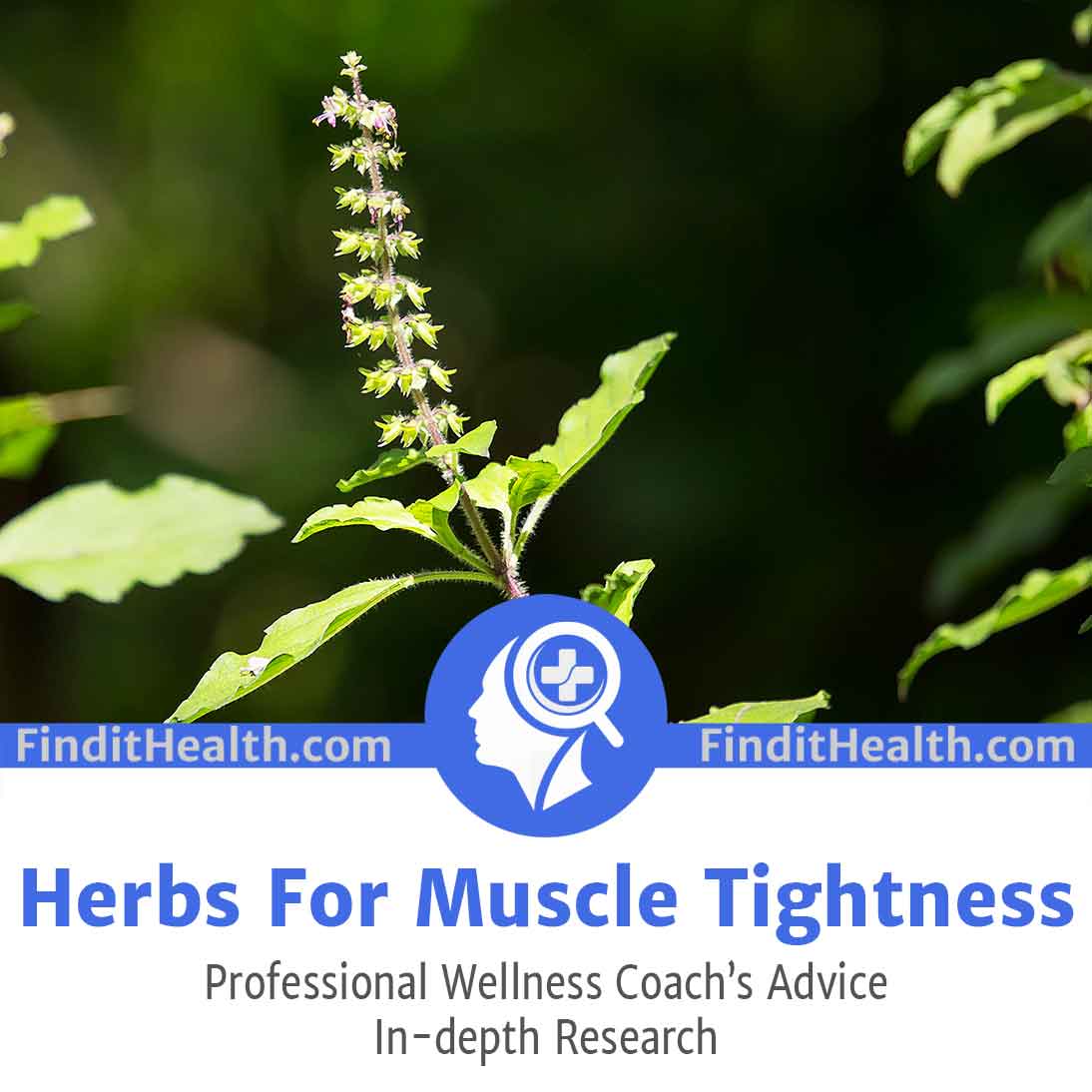
As the head coach of the Find It Health wellness team, I am dedicated to offering effective alternatives for minor discomforts that may bother you. This article delves into herbal medicine to address sore muscles and joint pain. Discover the potent anti-inflammatory properties of herbs, uncovering their active ingredients that soothe muscle tightness. Numerous studies have shown the efficacy of herbal remedies for these kinds of muscle aches, especially ones acquired from intense exercises like DOMS or delayed onset muscle soreness.
Explore how these natural remedies promote blood circulation, aiding in relieving discomfort and promoting recovery. Embrace the holistic power of herbs to alleviate muscle tension, harnessing centuries-old wisdom for modern well-being.
Herbs That Are Natural Muscle Relaxers
Here is a list of natural herbs that causes a decrease in muscle spasms due to their active ingredients with relaxing properties.
- Valerian root (Valeriana officinalis)
Application: Tea, tincture, supplement.
Mechanism: Valerenic acid interacts with GABA receptors which relaxes tense muscles.
- Passionflower (Passiflora incarnata)
Application: Tea, tincture, supplement.
Mechanism: Flavonoids like chrysin bind to GABA receptors, inducing muscle relaxation.
- Kava (Piper methysticum)
Application: Tea, tincture, supplement.
Mechanism: Kavalactones affect neurotransmitters, leading to muscle relaxation.
Application: Tea, oil, cream.
Mechanism: Apigenin in chamomile interacts with GABA receptors, easing muscle tension.
- Lavender (Lavandula angustifolia)
Application: Aromatherapy, massage, baths.
Mechanism: Inhaling lavender scent triggers specific receptors in the brain, leading to increased activity of the neurotransmitter GABA. This increase in GABA activity reduces nerve excitability, promoting muscle relaxation.
- Cramp Bark (Viburnum opulus)
Application: Tincture, tea, capsule.
Mechanism: Viopudial in cramp bark relaxes smooth muscles, alleviating spasms.
- Black Cohosh (Actaea racemosa)
Application: Supplement, tincture.
Mechanism: Compounds like triterpene glycosides (such as actein and cimicifugoside) affect serotonin receptors, reducing muscle discomfort.
SUBSCRIBE for FREE STRESS MANAGEMENT TECHNIQUES from our EXPERT COACHES!
Anti-Inflammatory Herbs For Muscle Pain
Here is a list of herbs that help with muscular pain. These herbs for muscle aches have active ingredients that have anti-inflammatory effects.
- Turmeric (Curcuma longa)
Application: Cooking, supplement.
Mechanism: Curcumin’s anti-inflammatory properties reduce muscle pain.
Application: Fresh, tea, supplement.
Mechanism: Gingerols from dietary ginger have anti-inflammatory effects which ease muscle discomfort.
- Boswellia (Boswellia serrata)
Application: Supplement, topical cream.
Mechanism: Boswellic acids inhibit inflammation, relieving muscle pain.
- Rosemary (Rosmarinus officinalis)
Application: Culinary use, oil, cream.
Mechanism: Rosemary’s antioxidants such as Rosmarinic acid, Carnosic acid, Caffeic acid, and certain flavonoids reduce muscle inflammation.
- White Willow Bark (Salix alba)
Application: Supplement, tea.
Mechanism: Salicin in willow bark acts as a natural pain reliever.
- Cat’s Claw (Uncaria tomentosa)
Application: Supplement, tea.
Mechanism: Alkaloids in cat’s claw have anti-inflammatory effects.
- Frankincense (Boswellia serrata)
Application: Aromatherapy, oil, supplement.
Mechanism: Frankincense’s compounds like boswellic acids reduce muscle inflammation.
SUBSCRIBE for FREE STRESS MANAGEMENT TECHNIQUES from our EXPERT COACHES!
Herbs For Muscle Recovery
Some herbal supplements could also help in aiding muscle recovery by increasing blood flow which carries more white blood cells that fight off infection at the site of injury. These herbs include:
- Arnica (Arnica montana)
Application: Topical cream, gel, ointment.
Mechanism: Arnica, specifically the active compound helenalin, enhances blood circulation, and aids muscle recovery.
- Comfrey (Symphytum officinale)
Application: Topical poultice, salve.
Mechanism: Allantoin promotes cell regeneration, aiding muscle recovery.
- Calendula (Calendula officinalis)
Application: Cream, oil, ointment.
Mechanism: Calendula’s properties support muscle healing.
- St. John’s Wort (Hypericum perforatum)
Application: Oil, cream, supplement.
Mechanism: Hyperforin aids tissue repair, assisting in muscle recovery.
- Gotu Kola (Centella asiatica)
Application: Supplement, topical use.
Mechanism: Triterpenoids in gotu kola enhance collagen production.
- Horsetail (Equisetum arvense)
Application: Tea, supplement.
Mechanism: Silica in horsetail supports connective tissue repair.
- Devil’s Claw (Harpagophytum procumbens)
Application: Supplement, tea.
Mechanism: Harpagoside has anti-inflammatory and analgesic properties for muscle recovery.
SUBSCRIBE for FREE STRESS MANAGEMENT TECHNIQUES from our EXPERT COACHES!
Mechanism for Relaxing Muscles
Transmitting Tranquility Signals
Imagine your muscles as a communication network, with each part contributing to movement and tension. In this network, herbs introduce specialized messengers called neurotransmitters, like GABA (gamma-aminobutyric acid).
GABA sends calming signals, similar to someone giving you a reassuring nod, guiding your muscles to relax. These signals prompt your muscles to ease up, much like taking a deep breath to unwind after a busy day.
The Neurological Harmony
At the heart of this process is how your body talks to itself. Some herbs have elements that connect with specific nerve receptors, like tuning in to a radio station. These connections send messages that gently tell your muscles to loosen up and let go of tension.
Addressing Inflammatory Agitation
Inflammation often accompanies muscle distress, acting as a double-edged sword exacerbating discomfort. Select herbs wield the ability to temper this inflammatory response. Their active ingredients engage in a therapeutic dialogue with the body’s immune system, alleviating the intensity of inflammation and contributing to muscular relief.
Catalysts of Recovery
Post-exertion or injury, herbs assume the role of facilitators in the recovery process. Their active constituents operate as catalysts for enhanced blood circulation, thereby ensuring the efficient delivery of reparative nutrients to fatigued muscles. This influx of nutrients supports cellular regeneration and paves the way for accelerated muscle recovery.
Frequently Asked Questions
What Herbs Are Good For Tight Muscles?
The following herbs help give relief from muscle tension.
- Valerian root (Valeriana officinalis)
- Chamomile (Matricaria chamomilla)
- Lavender (Lavandula angustifolia)
- Passionflower (Passiflora incarnata)
- Kava (Piper methysticum)
- Lemon Balm (Melissa officinalis)
- Skullcap (Scutellaria lateriflora)
- California Poppy (Eschscholzia californica)
- Cramp Bark (Viburnum opulus)
- Black Cohosh (Actaea racemosa)
How Do You Relax Tight Muscles Naturally?
- Stretching: Gentle stretches help ease muscle tension and improve flexibility.
- Deep Breathing: Relaxing breathing exercises oxygenate muscles and promote relaxation.
- Warm Baths: Soaking in warm water can alleviate muscle tightness and discomfort because the heat helps to relax and loosen the muscles, promoting increased blood flow and reducing tension.
- Massage: Skillful massages can release muscle knots and improve circulation.
- Hydration: Staying hydrated supports muscle function and reduces cramping because adequate hydration helps to maintain electrolyte balance, which is essential for proper muscle contraction and relaxation. Dehydration can lead to imbalances that contribute to muscle spasms and cramps.
- Herbal Teas: Certain herbal teas like chamomile or valerian can have muscle-relaxing properties.
- Epsom Salt Soaks: Epsom salt baths provide magnesium, which can relax muscles.
- Rest and Sleep: Quality rest and sleep aid muscle recovery and rejuvenation.
- Magnesium-Rich Foods: Foods like spinach, nuts, and whole grains can provide muscle-relaxing magnesium.
- Gentle Exercise: Low-impact activities like yoga or walking can help relieve muscle tension because they encourage gentle stretching and movement, which promote improved blood circulation to the muscles. This increased blood flow helps to release built-up tension and promote relaxation, ultimately reducing muscle stiffness and discomfort.
What Helps Chronic Muscle Tightness?
Here are some tips for overcoming chronic muscle tightness:
- Physical Therapy: Professional guidance with targeted exercises and techniques can address underlying causes of chronic muscle tension.
- Stress Management: Adopt stress-reduction strategies like yoga, mindfulness, or tai chi to mitigate chronic muscle tightness.
- Massage Therapy: Scheduled massages can effectively alleviate and manage chronic muscle tension.
- Mind-Body Practices: Incorporate relaxation techniques such as meditation, deep breathing, or progressive muscle relaxation to alleviate tension.
- Hydration: Proper hydration supports muscle function and may help reduce chronic tension.
- Professional Consultation: If chronic muscle tension persists, seeking guidance from a health professional is crucial for proper diagnosis and a tailored management plan.
What Vitamins Help Tight Muscles?
- Vitamin D
Mechanism: Vitamin D aids in calcium absorption, promoting healthy muscle contractions and relaxation. It also modulates inflammation, reducing muscle stiffness.
Sources: Sunlight, fatty fish, fortified dairy products.
- Vitamin B6 (Pyridoxine)
Mechanism: Vitamin B6 contributes to neurotransmitter production, facilitating effective communication between nerves and muscles. This helps prevent muscle spasms and cramps.
Sources: Whole grains, poultry, fish, bananas.
- Vitamin E
Mechanism: Vitamin E is an antioxidant that helps protect muscle cell membranes from damage. It supports proper blood circulation, reducing muscle soreness and tension.
Sources: Nuts, seeds, spinach, broccoli.
- Vitamin C
Mechanism: Vitamin C supports collagen production, aiding in muscle tissue repair. It also acts as an antioxidant, reducing oxidative stress that contributes to muscle tightness.
Sources: Citrus fruits, bell peppers, strawberries.
- Vitamin K
Mechanism: Vitamin K is crucial for proper calcium utilization, preventing calcium buildup in muscles that can lead to tension and discomfort.
Sources: Leafy greens, broccoli, Brussels sprouts.
- Vitamin A
Mechanism: Vitamin A supports muscle cell growth and repair. It also helps maintain the integrity of muscle cell membranes, promoting healthy muscle function.
Sources: Carrots, sweet potatoes, spinach.
Conclusion
The research done by Find It Health professionals showed that addressing muscle tightness through herbal remedies can be remarkably effective. Delving into the world of herbs, this article has uncovered a range of natural solutions for sore muscles and joint pain. The anti-inflammatory properties of herbs, driven by their active ingredients, hold the key to soothing muscle tightness.
The exploration into these herbs unveiled their role in promoting blood circulation, facilitating muscle comfort, and accelerating the healing process. By harnessing the wisdom of traditional herbal medicine, individuals can find respite from muscle tension that spans centuries.
Before embarking on an herbal journey, it’s wise to consult a medical professional. Their expertise can guide you in incorporating these herbal allies into your wellness routine, ensuring harmony between natural remedies and personalized healthcare. This vital step ensures that healthcare professionals can assess potential interactions and counteract active ingredients, guaranteeing your safety and well-being.

